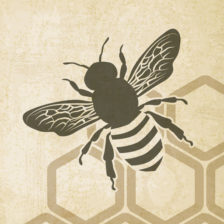Aix-en-Provence, France
I have attended the Annual General Assembly of ADAPI (Association pour le Développement de l’Apiculture Provençale) at the Maison des Agriculteurs, 22 Avenue Henri Pontier, 13626 Aix-en-Provence, FRANCE,
ADAPI is my host organization here in France. It is best described and an association of associations. These include: SAPP (Syndicat des Apiculteurs Professionels de Provence), SAP 13 (Syndicat des Apiculteurs Professionels des Bouches du Rhone), two GRAPPs (Groupement R‚gional des Apiculteurs Pollinisateurs Professionnels), SPM PACA (Syndicat de Promotion des Miels de Provence-Alpes-Cote d’Azur) and four CETAs (Centre d’Etudes des Techniques Agricoles). Together these represent some 200 beekeeping operations.
ADAPI was formed in 1986. It has had one director, Mr. Pascal Jourdan. Mr. Jourdan comes to this job as a beekeeper and student who published a detailed study of apiculture in the region as reported in L’Apiculture méditerranéenne, Une Profession Agricole Dynamique, published in 1982 by the institute Technique de l’Apiculture et Office Pour l’Information et la Documentation en Apiculture (OPIDA). The Association represents professional (commercial) beekeeper interests in the Provence-Alpes-Cote d’Azur region of France.
The general goal of ADAPI is to help member beekeepers confront present realities in the profession. The association does promotion and experimentation and also disseminates the results to its member associations. In specifics for the 1996-7 reporting year, the association:
1. Performed Varroa control experiments using a number of materials, including formic acid, coumaphos, rotenone and Apilife Varr , a material based on oils of essence.
2. Produced a survey to determine bee disease and insecticide poisoning incidents among professional beekeepers.
3. Performed experiments and published results in using Pollinusr as a beek attractant to improve pollination in cantaloupe and strawberry in collaboration with INRA.
4. Assisted those interested in obtaining a “Red Label” for mountain honey, by helping to characterize the product’s unique qualities.
5. Continued work on a major economic survey of member beekeeping operations.
6. Worked on honey export issues and with the press to increase awareness of honey and its potential in the marketplace.
7. Helped groups of Corsican and Republic of Georgian beekeepers come to the south of France to see how professional beekeepers work (see letter dated March 8, 1997). Finally, ADAPI has had contact with beekeepers in Algeria and Reunion Island.
Besides the above the Association is currently running trials on the product called Bee Boost® which is based on the queen bee’s mandibular pheromone. ADAPI’s potential activities appear to be only limited by the number of knowledgeable employees and available funding.. Mr. Jourdan, however, with limited resources has been able to creatively use the efforts of students and others to form a durable team. One young person, for example, has chosen to work in public service at ADAPI instead of military duty that is compulsory in France
ADAPI works on a budget of about 930,000 FF (US$ 160,000). Predictably in this kind of service organization, over half of the funding (US$ 90,000) goes for salaries. Of its working budget, most of the funding appears to come from governmental sources of one form or another with the adherents or members paying about one tenth of the costs (US $15,000). This is another example of the financial assistance the French government provides to agricultural industries.
The future of ADAPI seems bright. Mr. Jourdan is, however, somewhat a victim of his success. A valuable employee, for example, Mr. Marc Subirana, trained under Dr. Bernard Vaissiere at the INRA station in Avignon, who was responsible for carrying out much of ADAPI’s research efforts has been lured away to become director of a sister organization, ADARA (Association pour le Développment de l’Apiculture Rhonalpienne). This is a testament to the Association’s success as a French model that works well integrating both practical research and information delivery in the service of its clientele.

